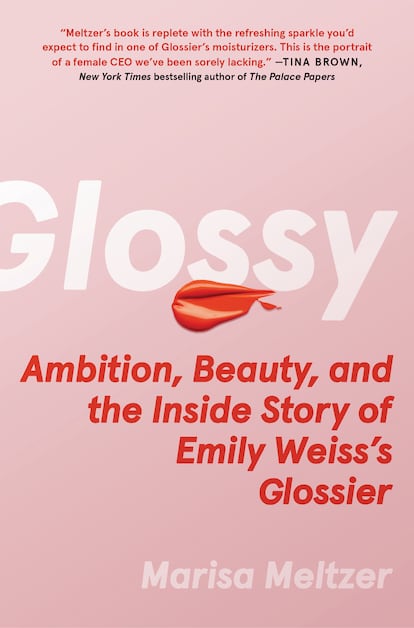Inclusive, aspirational and feminist: How the story of Glossier summarizes the contradictions of the last decade in beauty
The cult cosmetics firm turns nine years old and begins a new stage without Emily Weiss, its famous founder. A new book examines its origins and analyzes how it became a phenomenon
The New York Post’s weekly horoscope used to hang in the elevator at Glossier’s New York offices for the employees to read and comment, probably through one of their Slack channels. Emily Weiss herself, the founder of this cosmetic brand that in 2021 was valued at $1.8 billion, was the one who put it there. “It was one of the reasons why I felt like this was a workplace where I was having so much fun,” a former intern tells Marisa Meltzer in Glossy: Ambition, Beauty, and the Inside Story of Emily Weiss’s Glossier, a book that delves deep into the keys to the success and failure of the brand launched in 2014. “There are many women in fashion and beauty whose stories have not been told. I wanted to write a book that fans of the brand would enjoy, but that someone like my father could also read,” explains Meltzer.

The author interviewed Weiss several times over the years, but also more than 2,000 people in her orbit. “I loved talking to store employees about how difficult it was to get a job; it was almost like going through a casting. They had to send videos, do all kinds of interviews… then they were treated like celebrities in the neighborhood, they got free cupcakes, facials, things like that.” With millennial pink walls, beige armchairs, large windows and fresh orchids, the New York headquarters in the heart of SoHo was the epicenter of that aspirational universe in which Weiss was the cool boss who gave away products and sang karaoke. The brand’s Instagram account was full of beautiful images of that environment and the fans that used their products. And unlike other cosmetic companies and their photoshopped photos, theirs were fresh and natural pictures that anyone could relate to: there were wrinkles, freckles or imperfect teeth — although always aesthetically attractive.
Glossier opted for a disruptive approach that, compared to the Kardashian-style contouring that prevailed at the time, favored simple beauty; easy makeup that, instead of transforming the face, improved it. However, few things were simple between those pastel walls. The pictures of clients were not spontaneous, but carefully directed by the staff, and life in the office ended up resembling that of a high school. “If she was consciously trying to replicate tech culture, she was unconsciously replicating Condé Nast. In those corporate cultures, the beautiful and pedigreed and charismatic stood out,” notes the author. Because the journey of Weiss and Glossier is a tale full of nuances.

Condé Nast — the publisher of magazines like Vogue and Glamour — was actually one of Emily Weiss’s first work destinations in the early 2000s. After an internship at Ralph Lauren, the Glossier creator found an intern position at Teen Vogue and briefly appeared on the reality show The Hills. Although she was not born into an extremely wealthy family, privilege oozed from her every imperceptible pore: pretty, white, upper-middle class, well-connected. The walls of her room were painted Tiffany blue, and she went to school with a Louis Vuitton bag. “She could correctly pronounce chinoiserie and identify cottage roses,” Meltzer notes in her book.
As she made contacts at the magazine, Weiss noticed that while beauty involved large budgets, it lacked the attractive halo that surrounded fashion. In 2010, she launched the blog Into the Gloss, which brought cosmetics into popular culture. “I’d say it was fundamental in that change. There were all those fashion or street style blogs that were becoming famous, but there was no equivalent for beauty, even though there are products that are sold in tons and that everyone uses. Her idea was to show beauty through another, more intimate approach, put it under a new spotlight.” She proved to be a visionary with that movement, and her site became a regular destination for both insiders and fans.
Her followers were not only readers, but beauty fans, buyers willing to discuss the pros and cons of each product in the comments. Everything was close and felt real. Reading Into the Gloss was like being invited to a party at the house of really wonderful women. A party that, in 2016, had 1.3 million monthly guests. The audience was hooked and Weiss knew how to create around her content what today is the holy grail of digital marketing: a loyal community. But she did not stop there: she also used all that information about her readers as invaluable field work on the tastes of her audience, Data on which Glossier was built four years later. “She has a very good intuition for knowing what will be next,” points out Meltzer.
With its launch, Glossier changed the beauty industry, and five years later the company became a unicorn, valued at more than $1 billion. The Into the Gloss community loved to read, comment and share the articles. And that is what happened with the Glossier products when they came out, too, because they looked great on social media, with the pink and the packaging, explains the author. They managed to make them look aspirational, despite not being expensive.
Glossier’s influence transcended the world of beauty, and Weiss became an emblem of the Girlboss generation of young, high-profile women who ran successful companies, like Sophia Amoruso (Nasty Gal), Leandra Medine (Man Repeller) and Yael Aflalo (Reformation). In 2023, however, they have all taken a step back and resigned. Unlike her colleagues, Weiss was not canceled, but her defense of corporatist feminism and her millennial pink soon became obsolete, and in 2022 she left the position of CEO of the company after being at the center of many of the issues that defined an era: racial reckoning, the labor movement, pandemic shutdowns, supply chain problems and the fall from grace of female founders.
Some voices emerged to say that those jobs that required a casting process were not so wonderful, and the pandemic was lethal for the finances of the company, which had to close its stores. Weiss stepped down so that Glossier could be reborn, and the brand today is seeking a second wind among the zoomers that are finding it on TikTok. After nine years, a few months ago it stopped selling exclusively on its channels, reopened its stores and landed in 600 Sephora points of sale in the United States and Canada. Then, a few weeks ago, it became available (online, for now) in 180 countries. “We still have to see if the company has the potential to last,” points out Meltzer. “At Glossier they like to say that they are nine years old and that they will be a century-old brand like Estée Lauder and things like that. But that remains to be seen. It remains to be seen if these new generations will fall so in love with their products in a market that is much more saturated than it was a decade ago. Today there are many beautiful cosmetic brands; there is a lot of competition.” Because Glossier popularized a very specific aesthetic with such success, that today its main problem is being able to differentiate itself from it.

Sign up for our weekly newsletter to get more English-language news coverage from EL PAÍS USA Edition
Tu suscripción se está usando en otro dispositivo
¿Quieres añadir otro usuario a tu suscripción?
Si continúas leyendo en este dispositivo, no se podrá leer en el otro.
FlechaTu suscripción se está usando en otro dispositivo y solo puedes acceder a EL PAÍS desde un dispositivo a la vez.
Si quieres compartir tu cuenta, cambia tu suscripción a la modalidad Premium, así podrás añadir otro usuario. Cada uno accederá con su propia cuenta de email, lo que os permitirá personalizar vuestra experiencia en EL PAÍS.
¿Tienes una suscripción de empresa? Accede aquí para contratar más cuentas.
En el caso de no saber quién está usando tu cuenta, te recomendamos cambiar tu contraseña aquí.
Si decides continuar compartiendo tu cuenta, este mensaje se mostrará en tu dispositivo y en el de la otra persona que está usando tu cuenta de forma indefinida, afectando a tu experiencia de lectura. Puedes consultar aquí los términos y condiciones de la suscripción digital.









































